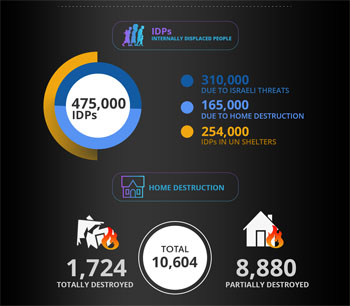Summary
Gaza has again been the focus of violations of human rights and international humanitarian law in the Occupied Palestinian Territory (OPT). In response to the capture of Corporal Gilad Shalit by Palestinian militants on 25 June 2006, and the continued firing of Qassam rockets into Israel, Israel conducted two major military operations within Gaza - “Operation Summer Rains” and “Operation Autumn Clouds”. In the course of these operations, the Israeli Defense Forces (IDF) made repeated military incursions into Gaza, accompanied by heavy artillery shelling and air-to-surface missile attacks. Missiles, shells and bulldozers destroyed or damaged homes, schools, hospitals, mosques, public buildings, bridges, water pipelines and electricity networks. Agricultural lands were levelled by bulldozers. Beit Hanoun was the subject of particularly heavy attacks, and on 8 November 19 civilians were killed and 55 wounded in an artillery attack. Economic sanctions have had a major impact on Gaza.
About 70 per cent of Gaza’s workforce is out of work or without pay and over 80 per cent of the population live below the official poverty line. The siege of Gaza is a form of collective punishment in violation of the Fourth Geneva Convention of 12 August 1949. The indiscriminate use of military power against civilians and civilian targets has resulted in serious war crimes.
The West Bank has also experienced serious human rights violations resulting from frequent military incursions; the construction of the Wall; house demolitions and checkpoints.
Over 500 checkpoints and roadblocks obstruct freedom of movement within the OPT. The Wall being built in East Jerusalem is an instrument of social engineering designed to achieve the Judaization of Jerusalem by reducing the number of Palestinians in the city.
The construction of settlements continues. Today there are some 460,000 settlers in the West Bank and East Jerusalem. A study by an Israeli non-governmental organization (NGO) has shown that nearly 40 per cent of the land occupied by settlements in the West Bank is privately owned by Palestinians. It has become abundantly clear that the Wall and checkpoints are principally aimed at advancing the safety, convenience and comfort of settlers.
There are some 9,000 Palestinian prisoners in Israeli jails. There are serious complaints about the treatment, trial and imprisonment of prisoners.
Since 2000, over 500 persons have been killed in targeted assassinations, including a substantial number of innocent civilians. In December 2006 the Israeli High Court failed to find that such assassinations were unlawful but held that they might only be carried out as a last resort and within the bounds of proportionality.
Israeli law and practice makes it impossible for thousands of Palestinian families to live together. A new practice of refusing visas to foreign residents in the OPT has aggravated this situation.
Discrimination against Palestinians occurs in many fields. Moreover, the 1973 International Convention on the Suppression and Punishment of the Crime of Apartheid appears to be violated by many practices, particularly those denying freedom of movement to Palestinians.
There is a humanitarian crisis in the OPT resulting from the withholding of funds owed to the Palestinian Authority by the Government of Israel (estimated at about US$ 50 to 60 million per month) and from the economic isolation of the territory by the United States, the European Union (EU) and other States in response to the election of the Hamas Government.
The Temporary International Mechanism set up by the EU to provide relief in certain sectors has gone some way towards reducing the crisis, but over 70 per cent of the Palestinian people live below the official poverty line. Health care and education have suffered as a result of a strike of workers in these sectors against the Palestinian Authority and the international community for the non-payment of salaries. In effect Israel and sections of the international community have imposed collective punishment on the Palestinian people.
Persons responsible for committing war crimes by the firing of shells and rockets into civilian areas without any apparent military advantage should be apprehended or prosecuted.
This applies to Palestinians who fire Qassam rockets into Israel; and more so to members of the IDF who have committed such crimes on a much greater scale. While individual criminal accountability is important, the responsibility of the State of Israel for the violation of peremptory norms of international law in its actions against the Palestinian people should not be overlooked.
The international community has identified three regimes as inimical to human rights - colonialism, apartheid and foreign occupation. Israel is clearly in military occupation of the OPT. At the same time elements of the occupation constitute forms of colonialism and of apartheid, which are contrary to international law. What are the legal consequences of a regime of prolonged occupation with features of colonialism and apartheid for the occupied people, the occupying Power and third States? It is suggested that this question might appropriately be put to the International Court of Justice for a further advisory opinion.
The Occupied Palestinian Territory is the only instance of a developing country that is denied the right of self-determination and oppressed by a Western-affiliated State. The apparent failure of Western States to take steps to bring such a situation to an end places the future of the international protection of human rights in jeopardy as developing nations begin to question the commitment of Western States to human rights.
To View the Full Report as PDF (244 KB)





